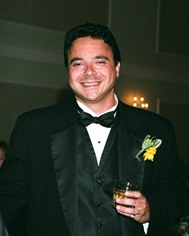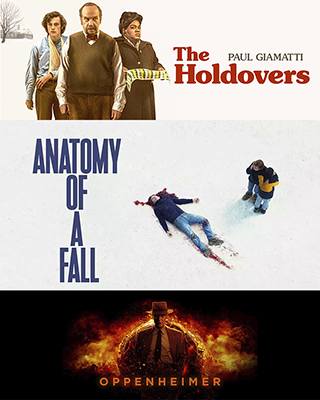With the Oscars being presented on Sunday, March 10th, I like to focus on the films and performances that I found most memorable. In keeping with the tradition of the late Siskel & Ebert’s “If We Picked the Winners,” here are my standouts for 2023 using the nominees in the main Academy Award categories. While others try to second-guess Oscar politics with who ‘should win’ or ‘will win,’ I like to keep it simple. In case you missed any of them, these are the films and performances I’ll remember- simply put, these are the ones:
Best actor – Paul Giamatti; Best supporting actress- Da’Vine Joy Randolph: “The Holdovers”
If there’s something we can all identify with, it’s the sense of being stuck. Whether we act cynically toward our circumstance or keep a stiff upper-lip, Giamatti and Randolph’s performances perfectly mirrored our emotions.
As residents of the elite Barton boys’ school who are stuck to stay during Christmas break in 1970, history teacher Paul Hunham (Giamatti) and head cook Mary Lamb (Randolph) are idealistic outsiders who serve privileged students while less fortunate boys are sent to serve as soldiers in the Vietnam War. One such boy is Mary’s son, a Barton boy not financially fortunate enough to attend college, who enlists only to lose his life in Vietnam.
As Mary, Randolph shows a mother grieving in silence while her eyes give knowing looks to students who look down upon her status. We also see Mary’s affection when commiserating with Paul while drinking bourbon from a coffee cup, reminding him to temper his disdain during the Christmas season for ‘holdover’ students remaining at Barton for break and away from their families. But it’s when Mary attends a party where people are surrounded by family and friends that Randolph shows Mary’s emotional floodgates break open and the release over the loss of her son is revelatory.
For Giamatti, his comic timing is used to great effect once again by director Alexander Payne as it had when the two worked together in 2004’s “Sideways.” While twisting his tongue around sarcastic, erudite dialogue is certainly a strength within Giamatti’s wheelhouse, what surprises you is how Giamatti slowly chips away at Paul Hunham’s armor to reveal the empathy within.
Ostracized by society for slight physical infirmities (ocular and odorous) and hated by his students for being a harsh taskmaster, Paul meets his match in holiday holdover student Angus (Dominic Sessa). Recognizing himself in Angus’ rebellious nature, Paul slowly breaks down his sternness by sidestepping rules (in stereotypical ‘70’s fashion) and embarking on a road trip with Angus where the two bond despite their constant caustic conflict because they share similar disillusionments. When Paul faces authority’s retribution for his relaxed monitoring of Angus, we have already seen Giamatti lay the groundwork for Paul’s gravitas. In Giamatti’s believable reveal of Paul’s true self, we also see how a skewed society can bury an individual’s ideals or mislabel righteous actions as rebellious.
Best actress- Sandra Huller; Best original screenplay- Justine Triet & Arthur Harari: “Anatomy of a Fall”
It’s been a while since a twisty mystery revealed more about our own complexities than those of a possible crime, but “Anatomy’s” script does just that. Forced to defend herself against an assumed homicide, Sandra Huller provides the provocative focal point as the victim’s wife, mesmerizing the audience with a strangely serene demeanor (versus expected distraught) that may mask a murderous motive.
When Samuel (Samuel Theis) falls from the second floor of his French chalet and is found dead by his visually-impaired son Daniel (Milo Machado Graner), Daniel’s shouts alert his mom Sandra (Huller). What’s odd about Samuel’s fall is he’d been working inside and could only have fallen after opening an attic window to go onto an outside railing. Since Sandra was the only one inside the chalet at the time, the cause for the calamity points toward bizarre accident, suicide or murder.
When Sandra enlists lawyer friend Vincent (Swann Arlaud) to help her with the impending indictment, Vincent coldly states her claim of innocence is nothing compared to the strategy they need to succeed in a subsequent trial, barring evidence that would exonerate Sandra. Unfortunately for Sandra, what’s revealed in the investigation into Samuel’s death is not the strange circumstance of a fall but evidence of an unhappy marriage.
“Anatomy’s” screenplay strongly sets up Sandra’s plight. How can one defend themselves against the complexities of marital conflicts? Or admit to affairs not meant to antagonize their partner? Or convince others that blaming a husband for a past harm did not result in throwing him to his death? What’s great in Huller’s interpretation of Sandra is watching her rational repose deteriorate as Sandra’s conflicts with Samuel become questioned.
From a supposed seduction of a stranger, baffling bodily bruising or a secretly recorded marital spat, Sandra must defend herself against accusatory inferences. As an audience, the seeds of ambiguity in Sandra’s innocence begin to sprout as we see Sandra’s reserved manner become enraged in handling Samuel’s unhappiness. Whether exasperated at trying to explain Sandra’s innocence or flummoxed at being found out, Huller makes us wonder if Sandra’s character is ever knowable. Within a screenplay designed to disguise the truth behind a tragedy, it does more to reveal our inherent need to find a reason in what we can never fully rationalize.
Best picture; Best supporting actor- Robert Downey, Jr.; Best director/best adapted screenplay- Christopher Nolan: “Oppenheimer”
It took a director of vision to compel us with an epic biopic of a scientist with visions, but that’s exactly what Christopher Nolan did with “Oppenheimer.”
Based on the novel “American Prometheus,” Nolan wrote and directed a film depicting the period of J. Robert Oppenheimer’s life from his days as a student studying a fledgling form of science (in quantum physics) to adapting these new theories to a frightening fruition. The fact that his creation was the atomic bomb and would be detonated to end World War II is only one of the ironies Nolan presents for a pioneer whose work would be both celebrated and scorned.
To get inside Oppenheimer’s mind, director Nolan dazzles with his visions of raindrop ripples expanding to seismic explosions. As nuclear fission is discovered, Oppenheimer (Cillian Murphy) realizes his theories can save a world at war: atomic chain reactions are best suited to build a bomb. When his work brings him to the attention of the military in 1942 and he’s asked to be director of the Manhattan Project, Oppenheimer is more than happy to comply in creating the bomb (as a Jew, beating Hitler to the punch is the prize). However, Hitler’s defeated before the A-bomb’s completed. When Japan picks up the baton to continue the battle, Oppenheimer wants the bomb’s use noted by the Soviets as to not view the U.S. as a threat, The result is a bittersweet victory: while his work brings WWII to an end, Oppenheimer has brought the ultimate weapon of extinction into existence and the uninformed Soviets make a bomb in retaliation, starting the nuclear arms race.
Amidst admirers came adversaries, mainly Atomic Energy Commission (AEC) head Lewis Strauss (Robert Downey Jr.) who believed Oppenheimer’s tie-in to Communists may have helped the Soviets build their own bombs quickly. In another irony, though Strauss advocated Oppenheimer’s appointment as scientific advisor to the AEC, Strauss was publicly embarrassed by Oppenheimer’s opposing view of exporting radioisotopes and perceived a slight when Oppenheimer spoke to Albert Einstein (Tom Conti) in front of Strauss.
Using his political influence to revoke Oppenheimer’s security clearance through a private security hearing, Strauss plotted payback. While director Nolan shows Strauss’ present-day story using contrasting black-and-white footage to support his opposing role, Downey allows us to see the blinding pride that permeated Strauss’ character. When Strauss recalls his relationship with Oppenheimer to his aides, Downey’s emphatic phrasing denotes a man consumed by a wounded pride.
Despite moral leanings or the ‘because we could, should we’ argument, Nolan’s tone places more emphasis on destiny and fate. If we view building the atomic bomb as Oppenheimer’s destiny, the idea of showing its savagery to promote peace remains our misguided fate.
Enjoy this year’s Oscars and in discovering the future Oscar winners of 2024.

